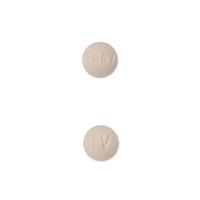Amlodipine/hydrochlorothiazide/valsartan and Alcohol/Food Interactions
There are 9 alcohol/food/lifestyle interactions with amlodipine / hydrochlorothiazide / valsartan.
Hydrochlorothiazide Alcohol (Ethanol)
Moderate Drug Interaction
HydroCHLOROthiazide and ethanol (alcohol) may have additive effects in lowering your blood pressure. You may experience headache, dizziness, lightheadedness, fainting, and/or changes in pulse or heart rate. These side effects are most likely to be seen at the beginning of treatment, following a dose increase, or when treatment is restarted after an interruption. Let your doctor know if you develop these symptoms and they do not go away after a few days or they become troublesome. Avoid driving or operating hazardous machinery until you know how the medications affect you, and use caution when getting up from a sitting or lying position. It is important to tell your doctor about all other medications you use, including vitamins and herbs. Do not stop using any medications without first talking to your doctor.
Amlodipine Alcohol (Ethanol)
Moderate Drug Interaction
AmLODIPine and ethanol (alcohol) may have additive effects in lowering your blood pressure. You may experience headache, dizziness, lightheadedness, fainting, and/or changes in pulse or heart rate. These side effects are most likely to be seen at the beginning of treatment, following a dose increase, or when treatment is restarted after an interruption. Let your doctor know if you develop these symptoms and they do not go away after a few days or they become troublesome. Avoid driving or operating hazardous machinery until you know how the medications affect you, and use caution when getting up from a sitting or lying position. It is important to tell your doctor about all other medications you use, including vitamins and herbs. Do not stop using any medications without first talking to your doctor.
Alcohol (Ethanol) Valsartan
Moderate Drug Interaction
Valsartan and ethanol (alcohol) may have additive effects in lowering your blood pressure. You may experience headache, dizziness, lightheadedness, fainting, and/or changes in pulse or heart rate. These side effects are most likely to be seen at the beginning of treatment, following a dose increase, or when treatment is restarted after an interruption. Let your doctor know if you develop these symptoms and they do not go away after a few days or they become troublesome. Avoid driving or operating hazardous machinery until you know how the medications affect you, and use caution when getting up from a sitting or lying position. It is important to tell your doctor about all other medications you use, including vitamins and herbs. Do not stop using any medications without first talking to your doctor.
Hydrochlorothiazide Alcohol (Ethanol)
Minor Drug Interaction
Information for this minor interaction is available on the professional version.
Amlodipine Multivitamins With Minerals
Moderate Drug Interaction
Using amLODIPine together with multivitamin with minerals can decrease the effects of amLODIPine. Talk with your doctor before using amLODIPine and multivitamin with minerals together. You may need a dose adjustment or need your blood pressure checked more often if you take both medications. It is important to tell your doctor about all other medications you use, including vitamins and herbs. Do not stop using any medications without first talking to your doctor.
Hydrochlorothiazide Multivitamins With Minerals
Minor Drug Interaction
Information for this minor interaction is available on the professional version.
Valsartan Food/Lifestyle
Moderate Food Interaction
Consumer information for this interaction is not currently available.
GENERALLY AVOID: Moderate-to-high dietary intake of potassium, especially salt substitutes, may increase the risk of hyperkalemia in some patients who are using angiotensin II receptor blockers (ARBs). ARBs can promote hyperkalemia through inhibition of angiotensin II-induced aldosterone secretion. Patients with diabetes, heart failure, dehydration, or renal insufficiency have a greater risk of developing hyperkalemia.
MANAGEMENT: Patients should receive dietary counseling and be advised to not use potassium-containing salt substitutes or over-the-counter potassium supplements without consulting their physician. If salt substitutes are used concurrently, regular monitoring of serum potassium levels is recommended. Patients should also be advised to seek medical attention if they experience symptoms of hyperkalemia such as weakness, irregular heartbeat, confusion, tingling of the extremities, or feelings of heaviness in the legs.
Amlodipine Food/Lifestyle
Minor Food Interaction
Information for this minor interaction is available on the professional version.
Switch to professional interaction data
Hydrochlorothiazide High Cholesterol (Hyperlipoproteinemia, Hypertriglyceridemia, Sitosterolemia)
Moderate Potential Hazard, Moderate plausibility
thiazides - hyperlipidemia
Thiazide diuretics may increase serum triglyceride and cholesterol levels, primarily LDL and VLDL. Whether these effects are dose-related and sustained during chronic therapy are unknown. Patients with preexisting hyperlipidemia may require closer monitoring during thiazide therapy, and adjustments made accordingly in their lipid-lowering regimen
Switch to professional interaction data
Amlodipine/hydrochlorothiazide/valsartan drug interactions
There are 782 drug interactions with amlodipine / hydrochlorothiazide / valsartan.
Amlodipine/hydrochlorothiazide/valsartan disease interactions
There are 22 disease interactions with amlodipine / hydrochlorothiazide / valsartan which include:
- diabetes
- angioedema
- hypotension
- cardiogenic shock/hypotension
- coronary artery disease
- liver disease
- anuria
- electrolyte losses
- liver disease
- lupus erythematosus
- renal function disorders
- CHF
- hyperkalemia
- renal impairment
- CHF/AMI
- asthma
- diabetes
- hyperlipidemia
- hyperparathyroidism
- hyperuricemia
- thyroid function tests
- renal/liver disease
More about amlodipine / hydrochlorothiazide / valsartan
- amlodipine/hydrochlorothiazide/valsartan consumer information
- Check interactions
- Compare alternatives
- Pricing & coupons
- Reviews (7)
- Drug images
- Side effects
- Dosage information
- During pregnancy
- Drug class: miscellaneous antihypertensive combinations
- En español
Related treatment guides
Drug Interaction Classification
| Highly clinically significant. Avoid combinations; the risk of the interaction outweighs the benefit. | |
| Moderately clinically significant. Usually avoid combinations; use it only under special circumstances. | |
| Minimally clinically significant. Minimize risk; assess risk and consider an alternative drug, take steps to circumvent the interaction risk and/or institute a monitoring plan. | |
| No interaction information available. |
See also:
Further information
Always consult your healthcare provider to ensure the information displayed on this page applies to your personal circumstances.


